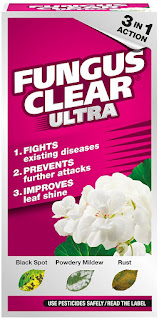Roses are a delight in any garden but some varieties can be susceptible to a virulent fungal disease commonly known as Blackspot. The good news is that it is completely treatable by a range of fungicides that are readily available here in the UK. I will also give you a few tips below should you want to take a more organic approach.
Symptoms are easy to spot with fungal black spots appearing on the leaves which as they grow larger turn the foliage on which they are spreading yellow. Eventually the leaves fall off which leads to a dramatic effect on the overall health and vigour of the rose and how many blooms it produces. The disease can quickly spread to other plants so early treatment is recommended.
Fungus Clear ultra is one of the products I use and as with most fungicides is systemic. That is to say that it is absorbed by the leaves when applied and moves freely through the plants sap treating the existing disease and more importantly helping to prevent further fungal growth. A kind of 'immunization' if you like against further infection. Ideally you can start applying fungus clear as soon as new leaves emerge in the spring which should prevent the disease taking hold through the season but certainly as soon as you notice black spots appear. This product comes as a concentrate so a small quantity needs to be measured (measure supplied) and mixed with water and applied every 2-3weeks through summer. You will need a suitable sprayer with which to apply the mixture such as the one above which comes in 5L 7L(as picture) or 10litre capacity. Both Fungus clear and Sprayer come with full instructions.
Roseclear Ultra is another equally good blackspot fungicide. It is also systemic, controlling the existing fungus and preventing further infection to your roses from the inside out.
In addition Roseclear has an added insecticide, which is helpful if you have an infestation of greenfly or blackfly which usually congregate under the leaves and around newly forming buds. I always take a bit more care when spraying Roseclear (or any garden insecticide) to avoid contact with bees. With this in mind spraying is usually best done in the evening when bees are less active. The product comes both as a concentrate that you mix with water and apply with a sprayer such as the one above. And in a mixed ready to use gun applicator, which is more suitable for smaller gardens with one or two roses.
ORGANIC CONTROL
Blackspot is caused by a fungus which releases spores. Collecting infected and fallen leaves will help in preventing the disease spreading to other plants. This is particularly useful in Autumn when roses shed most of their leaves. You should safely burn all that you find. A good idea is to then cover your rose border with a mulch such as mushroom compost or bark chips. This will help spores reaching new shoots as they emerge in the Spring. This is not a 100% cure unfortunately as spores can blow in on the wind from other infected gardens. The Organic community seems to have many different ideas and recipes on controlling blackspot including solutions containing milk, baking soda, vinegar etc. I haven't tried any of them but it must be said I don't discount any. Always worth a try if you don't want to use chemicals. Please share any success's you've had in comments.General discussion and your views are welcome please say hello. I regret however because of my busy schedule, I am unable to answer many questions. Sneaky advertising will be deleted sorry. Thanks so much for visiting my blog today.








No comments:
Post a Comment